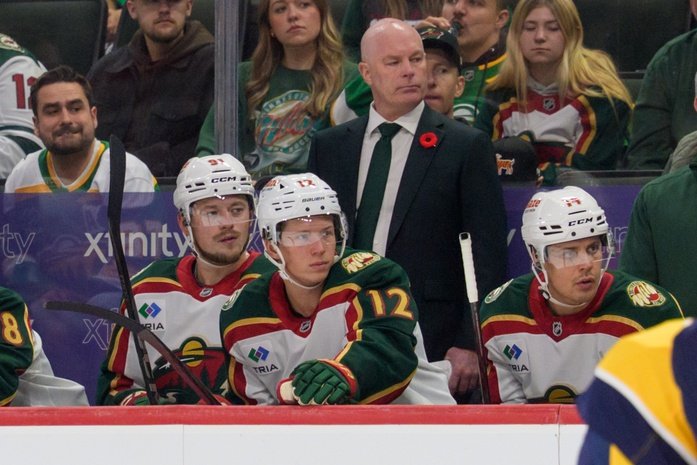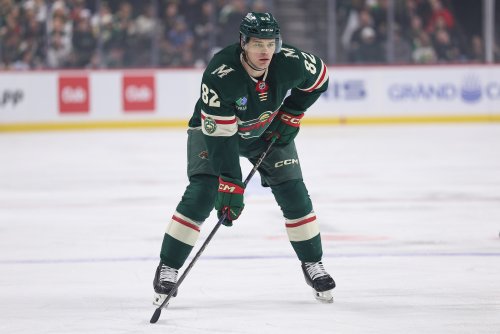
The Minnesota Wild broke their 5-game losing streak on Saturday with a 5-2 win over the Vancouver Canucks. Was that the catalyst that turned their season around, or were the last two wins more of an outlier in a 5-6-3 season?
After Minnesota’s 4-1 loss to the Pittsburgh Penguins, assistant captain Marcus Foligno said the Wild “let the foot off the gas pedal at certain times.” That feels accurate, considering Minnesota has had great moments this season, but seems to lack effort at key moments.
John Hynes also asked, “Why don’t we get a little bit tougher?”
The word “toughness” brings two things to mind: consistency and physicality.
Physicality isn’t the Wild’s strong point, and it wasn’t a key part of their game last year either. In the 2024-25 season, Minnesota ranked 22nd in penalty minutes with 612, compared to the top-ranked Florida Panthers' 843 minutes. This season, they’re tied for 30th with 87 minutes so far.
The Wild rank 9th for hits this season, with 296. Last season, they ranked 22nd with 1645, compared to the Florida Panthers, who led the league with 2,446 hits. Who makes the hits is also important. Yakov Trenin is leading the team in hits with 62 so far this season, despite averaging 13:10 TOI. Kirill Kaprizov has just 2 hits. It's great to see Trenin getting physical, but it’s not effective when it comes from just a few players.
Hits and penalties don’t necessarily correlate to wins. The Philadelphia Flyers lead the league with 169 penalty minutes right now and rank last in the Metropolitan Division for points. However, they’re a strong indicator of how tiring you are to play again, and in a sense, the team’s collective effort.
There are times you need to make a hit, even if that’s not your typical playstyle. One of these moments was against the San Jose Sharks on October 26. Kaprizov made a pass through the center that Timothy Liljegren picked off. Liljegren walked down through most of Minnesota’s line, but most noticeably Kaprizov, who only has two hits on the season. He takes a slow swipe at the puck, and Liljegren easily beats him.
It’s an unfortunate example of Minnesota lacking both kinds of toughness. They weren’t getting physical or making that extra effort. Kaprizov developed his talent in the KHL, where speed and puck-handling are more important on bigger rinks than getting physical. He might not enjoy laying out big hits, but as Hynes said, “Competitive level on the puck is not a style.”
Scoring tons of goals isn’t enough if he can’t get physical when necessary, especially when it sets a poor example for the rest of the team.
Overall, this moment reflects the team's effort in the last several games. Jake Middleton gets a pass because he’s actively wrestling Adam Gaudette’s stick off the ice, and so does Jesper Wallstedt for a solid first save. However, everyone else is simply watching the puck carrier.
There’s a noticeable difference between a regular game and overtime or playoffs that’s difficult to quantify other than “wanting it more”.
We can see this kind of play in hard back checks and forechecks in the same shift, hustling to the puck 100% of the time, and a last-ditch effort to maintain control of the puck or make the play.
For example, Matt Boldy was rushing down the ice and received Joel Eriksson Ek’s pass, but had no space to pass or shoot around Tom Willander. Instead of a dump low or a weak backhand shot, Boldy spins to get a more solid shot on net.
Another key difference is players covering for each other and being hungry for rebounds. Boldy stickhandled through two Vancouver players, lost the puck, but Eriksson Ek recovered it. Eriksson Ek popped it to the left, which Vladimir Tarasenko picked up, shot, and scored.
Later in the game, Brock Faber took a shot on net, which Thatcher Demko saved, but gave a rebound. Marcus Johansson immediately shot the rebound, which Demko also snagged.
Watching these games, it felt like the individual players stopped waiting for their teammates to step up and were hungry to pick up the loose puck and make the play themselves. Loose pucks and rebounds became shots on net instead of turnovers.
Great teams play with this playoff-level drive year-round. Still, that’s physically demanding to keep up. Minnesota has been able to get by as a less physical team in the past. However, they’re not making the hits or picking up the sticks they need to be, so it’s becoming a weak point in their game. The Wild don’t need to play like it’s their last game every time, but they need to bring up their baseline energy if they want to make the playoffs again.
Think you could write a story like this? Hockey Wilderness wants you to develop your voice, find an audience, and we'll pay you to do it. Just fill out this form.
-
 1
1






Recommended Comments
Join the conversation
You can post now and register later. If you have an account, sign in now to post with your account.
Note: Your post will require moderator approval before it will be visible.